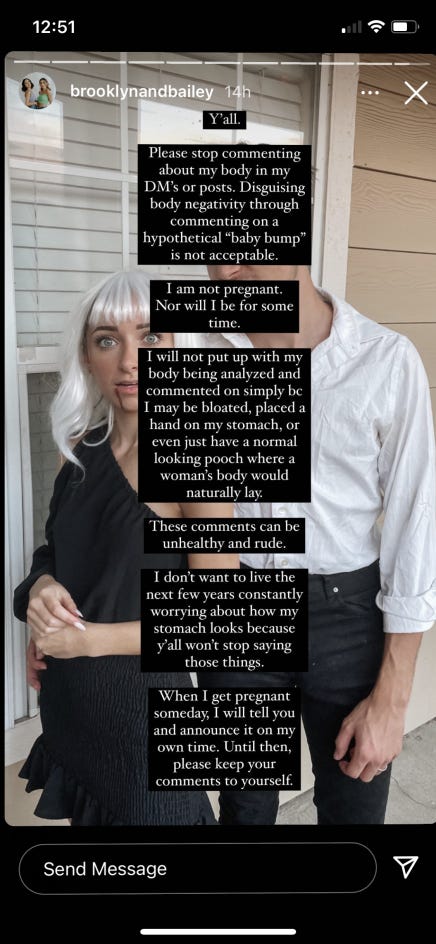When I was growing up in the Presbyterian church in the ‘90s, there was a story that my youth pastor used to tell. The specifics have blurred with time, but it involved an intense high school relationship with a girlfriend — one that was too intense, which we were meant to understand as too sexy time. In the stories, this intensity was objectified in the form of a blowdryer she gave him for his birthday.
Never mind that this pastor actually did blow dry his hair (both in the past and present) and that the gift was, in fact, pretty practical. Blowdryer girlfriend became the primary way that premarital sex was narrativized to a group of junior high and high school students: as a ridiculous mistake.
Within this configuration, sex — and masturbation — were things that happened when you lowered your defenses. You get pulled in, and then wake up with a girlfriend who gives you a blowdryer as a birthday present. You come to your senses, and you’ve “spoiled” the gift you wanted to give your future spouse. You’re gum that’s already been chewed (yes, this was an actual and very common metaphor) and you will swim in shame the rest of your life.
Whether or not you grew up within the Christian church, these messages, like so much of Christian culture, were in the American water supply. They’ve shaped the content of Hollywood for decades. They’ve drawn the lines of what counts as sexual “transgression.” They helped determine who was the butt of the joke, who was redeemable, who could run for office, who could get away with what and for how long. Sometimes these values are referred to as “puritanical,” as a sort of synonym for “moralizing” or “strict.” But that misses the more Calvinistic valences of the word, the not-so-subtle infusion of pre-destination — aka, the idea that some of us have been chosen by God, and some of us have not, and our behaviors generally illuminate who has the party invite and who’s been passed over.
This part of Calvinism always messed with my head a bit, so you are excused if it also messes with yours — it feels like a scammer behavior to tell people “keep acting like you’re invited to the party and maybe you will be.” Theoretically, of course, every person has equal likelihood of getting the party invite. But it sure does seem like men had an easier time playing the part. Like Adam, they have to resist sin — the siren song of the blowdryer girlfriend. But women? They aren’t just deflecting blowdryer girlfriend, they are blowdryer girlfriend.
To eradicate sin in this scenario requires self-abnegation — and since no one can self-abnegate entirely, it means that you just sit with your sinful nature every day. Yes, you are forgiven (theoretically) through the blood of Christ; no, that does not mean that you actually forget that you are animated sin. This is, of course, a pretty miserable way to live your life. It is also — just, you know, totally coincidentally — a pretty effective means of subjugating an entire group of people.
To be fair, many men within the Calvinist tradition have suffered mightily with the terror of their own certain damnation. But it’s like the difference between trying to get a chocolate stain out of your clothing versus, like, being the Gloppy monster in Candyland.
So imagine growing up in an environment like this, in constant warfare with yourself over every hormonal urge, just loathing your gloppy self — while also being told that you should orient your entire life towards the pursuit of a partner, marriage, and family. You should get close enough to someone that you want to marry them, but make sure you don’t have sexual feelings for them; you should understand sex as fundamentally sullying until the magic moment it is not. This is a trauma cookbook! You cannot inculcate someone with the idea that sex is the worst part of themselves and then expect them to embrace it.
Consider, too, how this works for queer people — who, in non-LGBTQ affirming Christian traditions, internalize their core, animating desires as inherently sinful. You can also see why so many queer Christians, trying to silence or eradicate those feelings, find themselves in heterosexual pairings. If you’re told desire is sinful, and you feel no desire in the relationship, then isn’t it, in fact, ideal? But then maybe once you’re married and supposed to be having sex, one partner doesn’t actually like hetero sex? And the other person feels like they’re doing something wrong? Another certain route to sexual and emotional trauma.
You can hear about the wages of this trauma in various episodes of the podcast The Rise and Fall of Mars Hill, which reconstructs the spread of a Seattle cool church headed by a charismatic quasi-Joe Rogan named Mark Driscoll. The podcast has significant issues — many of which I discussed with Kristin Du Mez here — but one of the things that stuck with me was Driscoll’s understanding of sex, and the ramifications of that understanding on women in the church.
Pre-marital sex, according to Driscoll’s teaching, is abhorrent, abject, blasphemous, disrespectful, etc. etc. But after marriage, that was a different story. And we’re not just talking about the dutiful “God thinks physical intimacy is beautiful, have you ever read Song of Psalms” way that marital sex is often referenced in many Christian churches. Driscoll essentially believes that women, post-marriage, should become their husband’s fantasies — in body, in behavior, in libido.
The result of this teaching: a nauseating rollercoaster for thousands of women, particularly for those who’ve disavowed their previous sexual history as part of a conversion and re-virginization when they joined the church. The message: Sure, those were the actions of a whore back then. But now they’re the actions of a perfect pliable wife.
But you can’t just flip a switch like that! That’s not how ideology works; that’s not how any of this works! But I also think the trauma is, well, the point. These teachings lead women to believe that they’re always failing, always lacking, and the responsibility for those failures is entirely their own — instead of the natural outgrowth of a structure designed to subjugate.
All of which brings me to the Baylor Influencer Twins — and a much-anticipated YouTube video detailing one of the twin’s “first time.”
I’ve written about the Baylor Influencer Twins several times throughout the last year, and I know many of you have come down this rabbit hole of fascination with me. Here’s the abbreviated backstory:
Three years ago, I was reporting on how Chip and Joanna Gaines have transformed the city of Waco, Texas. That story involved thinking a lot about how Waco has changed pre-Gaines, and that part of the story involved thinking about how Baylor University itself transformed itself into the “Baptist Notre Dame.” That meant meeting with professors and talking with students about the ongoing effort to recognize the LGBTQ group on campus and inspecting the newly constructed lazy river. It also meant spending a lot of time on the Instagram account of the school’s most famous residents — twin influencers Brooklyn and Bailey McKnight.
Brooklyn and Bailey are, technically, second generation influencers. Their mom, Mindy, made her five daughters the cornerstone of her Cute Girls Hairstyles social channels, and in 2013, the twins launched their own YouTube channel, which now has 6.91 million subscribers. The pair opted to go to Baylor over BYU, and once there, became official Baylor brand influencers — something I wrote a bit about back in 2020, when they both got Covid during their first weeks back on campus.
Since then, Brooklyn and Bailey have significantly expanded their clothing company (a curated collection of drop-ship items) and grown their Instagram (6.9 million) and TikTok (6.2 million) followings. Bailey got engaged to her long-time boyfriend Asa (I wrote about the fairytale playacting components here); Brooklyn and Bailey graduated from Baylor; seemingly every member of their extended family acquired labradoodles of some shade. Brooklyn started cosmetology school and introduced a new boyfriend, who runs a taco truck and managed to scrub his internet presence of all Trumpy references shortly before the announcement went live. Both Brooklyn and Bailey started doing this thing to their hair where they have two tiny whisps in the front that makes me feel ancient.
Oh, and Bailey and Asa got married. The marriage was the massive to-do you’d expect of an influencer — several outfit changes, lots of dusty rose, etc. etc. Asa is Christian but not LDS, and it doesn’t seem like there are any plans for him to convert, which also means that they were not sealed in the temple. (The McKnight family is Mormon, but they are fairly liberal when it comes to many LDS doctrines, including dress, occasionally drinking alcohol, and being vocally affirming of LGBTQ people). But Bailey and Asa did wait to have sex until they were married — and immediately began fielding requests to do a video about their first experience.
And now, several months after the fact, it’s here:
I’ve been anticipating this video with a posture that I can only compare to, like, watching America’s Best Home Videos and waiting for the dad in the grainy video of the baseball field to get hit in the balls. But then I watched it, and something weird happened. The video is….kinda great. It’s incredibly sex positive. It’s all about the importance of communication throughout. It doesn’t elide the fact that they had been physically intimate (but set boundaries for themselves) before, and doesn’t frame their decision as the only right decision. It’s light, and even funny in its particular way, but also treats a sexual relationship, and the intimacy that accompanies it, as an ever-evolving, serious thing.
Wild, right? But if you’ve been following Bailey’s trajectory over the last, oh, six months, none of this should be surprising.
First, back in October, Bailey forcefully pushed back on comments speculating on the existence of a baby bump:
Then, in November, she posted this pretty fantastic short video to TikTok, addressing persistent comments insinuating that Asa is gay. (I’m serious, it’s very good?)
Then she started talking about vibrators. She even linked to the vibrator she uses (why not get that referral $$) and acknowledged that used it before she was married because “I felt like it was important to at least know what worked/felt good etc so I could instruct my partner.” Friends, this is a SEX POSITIVE BAYLOR INFLUENCER TWIN!
When Bailey first started posting the vibrator links in her stories, various people started messaging me with different forms of confusion. And I get it: if you think of Brooklyn and Bailey primarily as conservative, or even just broadly Christian, this sort of behavior would feel very surprising. But LDS doctrine when it comes to sex is not the same as Evangelical or Calvinist doctrine on sex.
Like other Christians, Mormons believe that sexual intercourse should be saved until marriage. Unlike many other Christians, Mormons also believe that sex is awesome and not just for reproduction. As the church’s handbook for lay leaders puts it, “sexual relations within marriage are divinely approved not only for the purpose of procreation, but also as a way of expressing love and strengthening emotional and spiritual bonds between husband and wife.”
There are whole mini-industries within and related to the Mormon church working to cultivate that understanding long before a couple gets married. Back in 2018, Salt Lake Tribune reporter Courtney Tanner interviewed several therapists and researchers, including BYU professor Chelom Leavitt, about the doctrine that distinguishes the LDS posture towards sex. To start: within LDS teaching, Eve isn’t perceived as at fault for the fall of all mankind. “We don’t blame Eve,” Leavitt said. “In fact, we kind of revere Eve and feel like she made a great choice.”
Leavitt teaches classes to undergrads, including those recently married; she also researches sexual mindfulness and the role of orgasm in sexual and relational satisfaction, and how to have better and more open conversations about sex with kids. (There are significant fractures in the Mormon church when it comes accepting LGBTQ members; I found this advice from Leavitt on how to talk to kids about same sex attraction to be rather surprisingly affirming.)
The problem, then, is that even within the LDS church, there’s a gap between the doctrine and the way that doctrine trickles down to members. As one family therapist explained to Tanner, the culture in Utah in particular can overpower the actual teaching, particularly when that teaching focuses more on the danger of failings of chastity and far, far less on the promise and realities of sex itself. Put differently, the discipline, repression, and shame of patriarchal chastity culture eclipse the actual stated beliefs of the church.
What Bailey seems to have been able to do, then — whether because she’s not immersed in the dense Mormon culture of Utah, or because she didn’t go to BYU, or because of innate or engrained confidence, or because she or someone in her close circle had some great therapy — is separate theology from culture, belief from norms. And she’s modeling it in a way that frankly impresses me every day.
Like, this is the face of woman who has sold out vibrators! This is a glow-up! This is confidence! She is Gloppy the Candyland Monster and not embarrassed!
Now, do I still find the fairy tale narrative of their engagement regressive? Yes! Do I hate that the same narrative is now being mapped onto Brooklyn and her boyfriend whose taco truck is called HOMIEZ? Also yes! And to be clear: the LDS church has not fully or adequately grappled with its racist history and treatment of Black and Indigenous people; it has caused significant, enduring harm to thousands of gay ex- and current Mormons who have cleaved from their community simply because of who they are. I am not excusing or underplaying those truths.
But Bailey — and Asa, frankly — are also modeling a posture towards sex that, at least for their larger, longtime audience, is radical. It doesn’t have to feel that way to you, in this moment, right now. But it might be quietly changing the parameters of someone else’s world right now, softening the harshness with which they view themselves, their bodies, their desires and their peers. It might be changing the way they think about women’s worth, just generally, and giving them confidence to figure out what attitude towards sex works for them.
How do we know what we believe? What do we believe because we’ve sat with it, and interrogated it, and lived with it in the pit of our stomach? And what do we believe because others have told us we must?
Discerning the difference between the two is incredibly hard work. I don’t know if it’s ever over. But it’s also called growing up.
If you value this work, consider subscribing:
Subscribing is how you’ll gain access to the weekly Things I Read & Loved, but it’s also the way to participate in the heart of the Culture Study Community. There’s the weirdly fun/interesting/generative weekly discussion threads (this week’s Tuesday Thread on PERFECT ALBUMS was a true delight) plus the Culture Study Discord, where there’s dedicated space for the discussion of this piece (and a whole thread dedicated to Word games), plus equally excellent threads for Career Malaise, Productivity Culture, Home Cooking, Summer Camp Blues (for people dealing with the bullshit of kids summer camp scheduling), Spinsters, Fat Space, WTF is Crypto, Diet Culture Discourse, Good TikToks, and a lot more.
If you’ve never been part of a Discord: I promise it’s much easier and less intimidating than you imagine. Finally, you’ll also receive free access to audio version of the newsletter via Curio.
As always, if you are a contingent worker or un- or under-employed, just email and I’ll give you a free subscription, no questions asked. If you’d like to underwrite one of those subscriptions, you can donate one here.
If you’re reading this in your inbox, you can find a shareable version online here. You can follow me on Twitter here, and Instagram here — and you can always reach me at annehelenpetersen@gmail.com.














This made me cry, a lot. I'm a queer person constantly trying to reckon with my experiences growing up religiously. I'm 38, have been married (once to a man and now to a non-binary AFAB human) and I am STILL grappling with how sex works and makes me feel and undoing all the shame of it all. And it never hit me before that the trauma IS the point -- it explains why I am constantly feeling like I am failing and ruined and bad, no matter what I do or how I work through things. Thanks for saying things I've found hard to put into words.
Thanks for so perfectly capturing what it’s like to grow up female in the evangelical church. It took years of deconstructing to get me to a healthier place, but I still resent how much shame I carry around. It’s not healthy or fair to compare, and everyone is fighting their own battle — yet damn, what must it be like to not be raised to think your own body is sinful and undeserving of pleasure (until a man validates your sexual identity by marrying you)? Happy to see young people of faith changing the narrative.